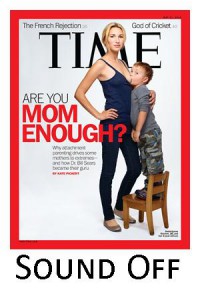By Rita Brhel, managing editor and API leader
 There is still a lot of discussion centering on Attachment Parenting, even though the controversial TIME coverage was almost three weeks ago, which is equal to eons away in our instantaneous, cluttered, sensationalism-saturated mass media. You know that something – some issue, some news story – has made it big when it’s still being talked about this long after the buzz first began.
There is still a lot of discussion centering on Attachment Parenting, even though the controversial TIME coverage was almost three weeks ago, which is equal to eons away in our instantaneous, cluttered, sensationalism-saturated mass media. You know that something – some issue, some news story – has made it big when it’s still being talked about this long after the buzz first began.
TIME is hardly the first to bring Attachment Parenting into mainstream light and not necessarily in a good light. In all fairness, the articles included in the TIME package on May 21, 2012, were probably the most fair, least biased of any mainstream coverage on the parenting style that I’ve seen. But it still perpetuated a lot of myths: One that particularly irks me is the claim that there is no research to back up Attachment Parenting, when in fact it is very well researched and one of the branches of research where there are very certain results, with studies all pointing in the same direction rather than some studies contradicting one another.
One of the myths that is particularly virulent – but then again, always has been – is that Attachment Parenting equals mommy martyrdom, that it asks too much of parents. I find this a little comical, because what does that say about you if you think that there is a parenting style that asks too much of you? As if your child isn’t worth it. Are there parents who think that way? I hope not.
What the argument is really, is revealing an overall lack of a sense of individual balance in our Western society. Asking us to do a little more for the betterment of our children, whom we love, wouldn’t be such a big deal if the majority of parents didn’t already feel tired and overworked and severely lacking some “me” time. If our emotional cups were already full most of the time. But they’re not. As a society, we seem to be constantly seeking contentment, chasing happiness.
There are plenty of theories abound of why this is, but I see it as our society asking too much of us. Mothers are supposed to work and raise children, and really, there are not many mothers who have a choice between working and staying at home. It isn’t a matter of selfishness but often out of necessity; rising food and fuel costs, access to affordable health insurance, debt, divorce – all these contribute to mothers’ lack of options. And at the end of the day, many mothers feel responsible for the housework as well.
What scares parents about Attachment Parenting is that it’s another thing to do, that it’s something else that they really need to do but just cannot get to, that not doing it could have real and lasting consequences and they already feel guilty of what they perceive to not be giving right now. Attachment Parenting isn’t asking too much of parents but too much of people who already have too much going on in their lives. To give our children as much time and energy that parents are imagining that we “attachment parents” give, well, it would require that they give up on something in their life – and that would probably be the only thing in their life that gives them any sense of personal balance. It would require them to completely overhaul their lifestyles and re-learn how to be content with a slower, simpler life – one where personal happiness wasn’t dependent on more, more, more.
This change in thinking would be daunting in the least – for some, impossible, unless they were willing to face and address their own unmet needs for emotional balance, and change the very way that they strive to meet that unquenchable void: by switching their priority away from materialism and instant gratification to quality relationships that require patience, commitment, sometimes hard work without meaningful results, and character strength.
That’s not the core of Western society, and that’s why Attachment Parenting isn’t yet mainstream. To “attachment parents,” it can be frustrating that attachment-promoting parenting techniques aren’t more widely accepted –shouldn’t love, that emotion that everyone desires to feel authentically, be an obvious way to raise our children? But for Attachment Parenting to become more mainstream, it couldn’t come by force or policy – that isn’t our way as “attachment parents,” anyway. It would have to come by a shift in our societal attitude.
LOVED your column… and I couldn’t agree more! I was attached parenting my daughter in the early 1990’s (when I was a teenage single mom) and didn’t realize what it was, or that it had a name. Now she’s grown, happy, balanced and I have a new (surprise!) beautiful baby boy. (By the way The Mama’s Boy Myth is a great read for those out there with little guys!) Thanks again for your words above.
I love this post! I love reading about other moms stories 🙂 I live in a area where Attached Parenting is almost unheard of and definitely looked down on. I think most moms are almost “scared” of this approch to parenting because of them fearing they will “spoil” their baby and long-termly delay them. Which couldnt be further from the truth from the truth by research that I’ve done. I hope to see more pages like this and get Attached Parenting FACTS more known to people who have a closed mind about the subject!! <3